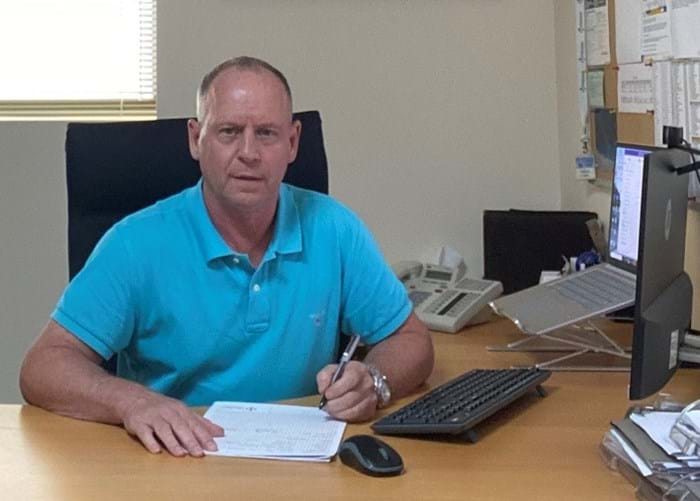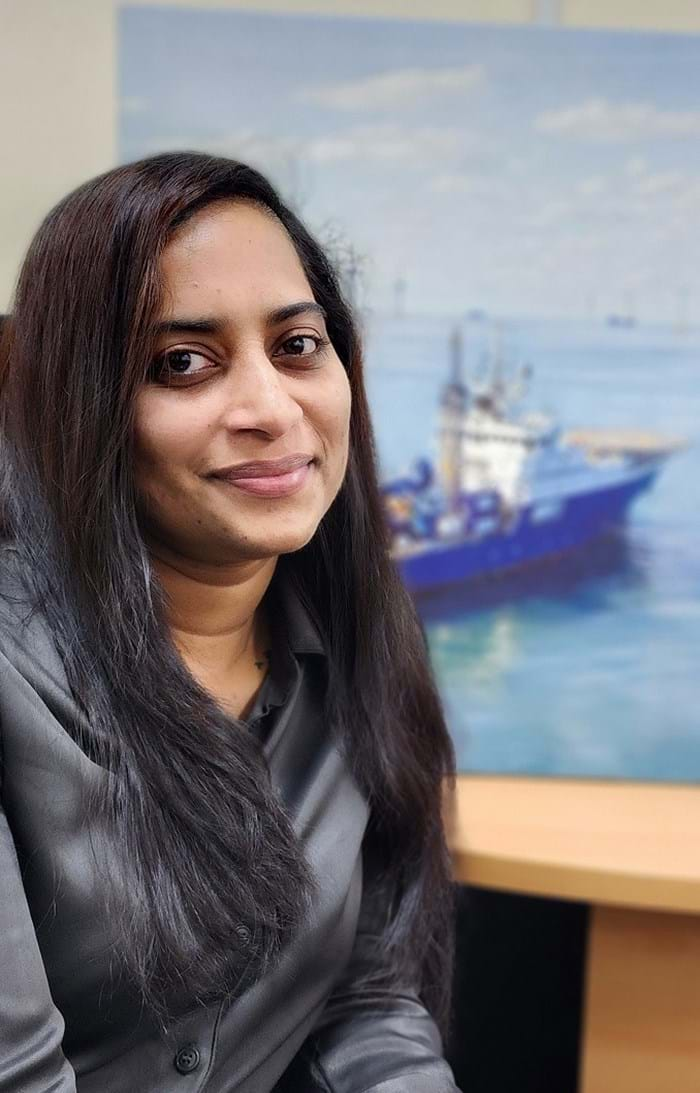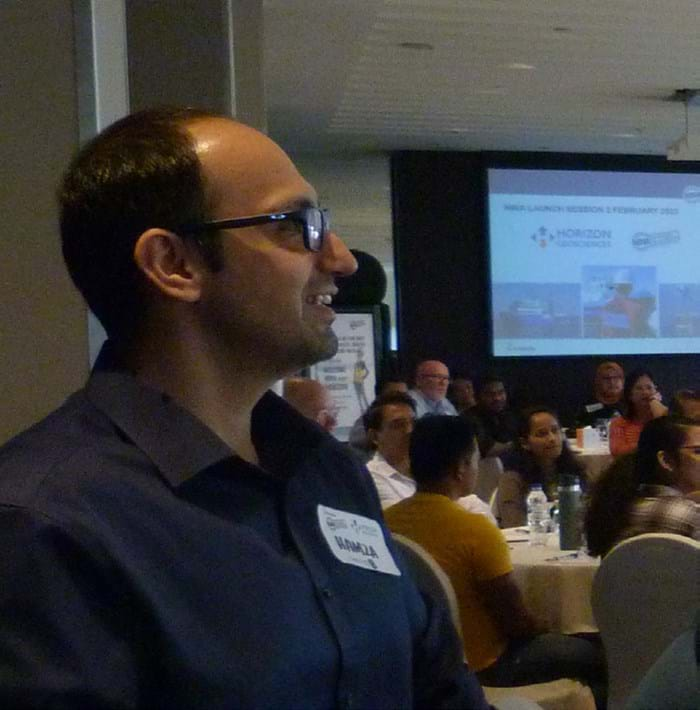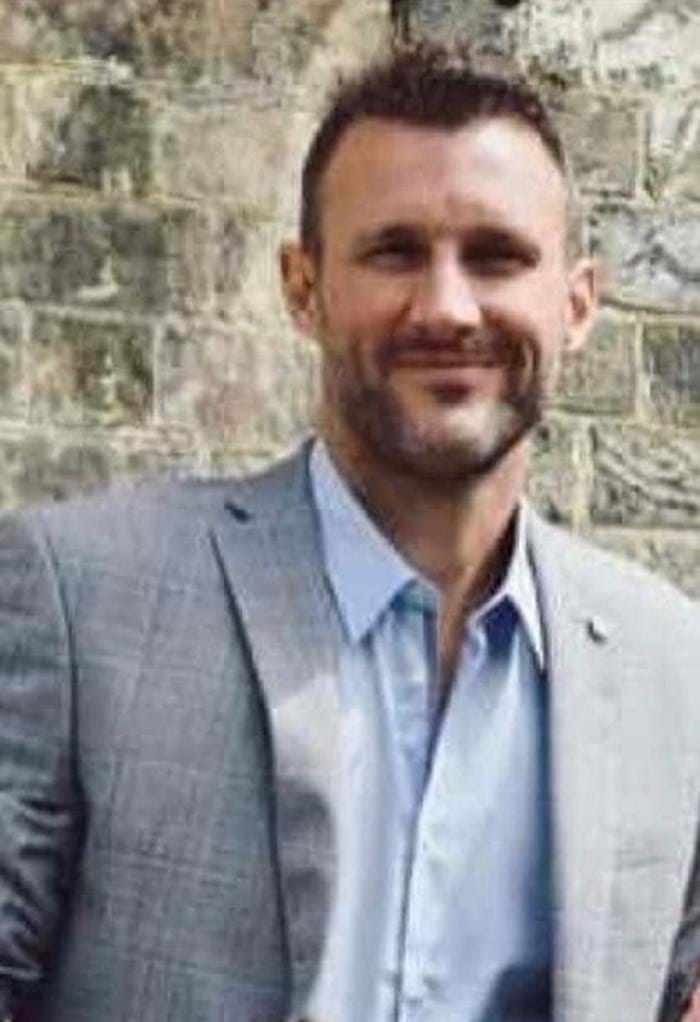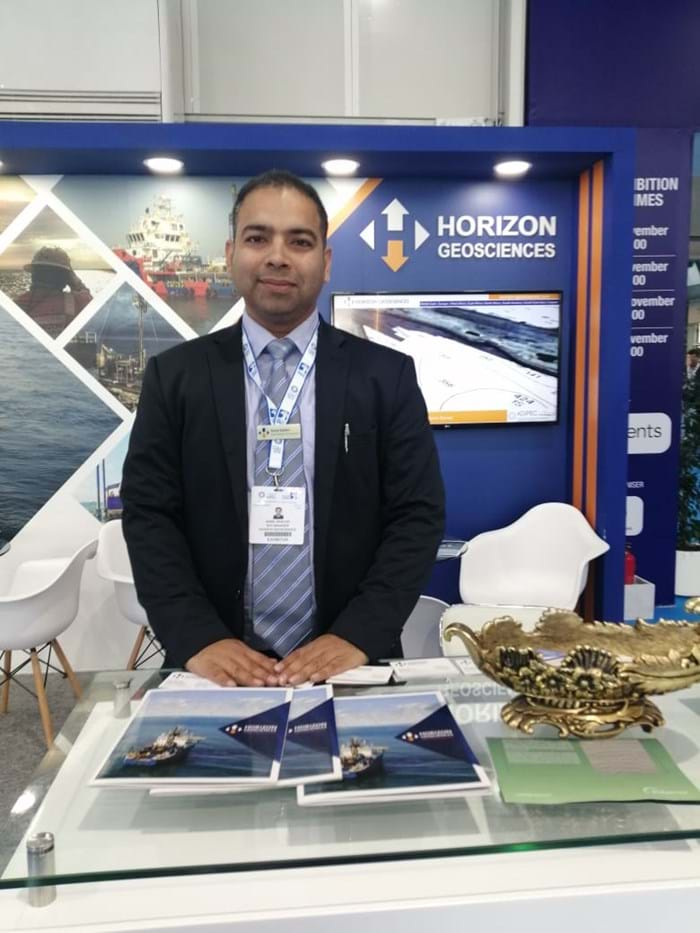Early February NINA was formally launched at Horizon in the UAE. During a two-day event, management and employees came together to share their views on safety and set common goals It was the next step in NINA's implementation process which started with an inventory regarding the current safety awareness within Horizon and was followed by a Senior Management training based on the analysis of the inventory. This careful approach revealed a lot of similarities between NINA and Horizon’s own values and everyday practices. NINA definitely got a soft landing within Horizon.
“I really embrace NINA, because I’m relieved it’s there.”
Brian Boyle, Chief Operating Officer, shares his views on the importance of safety and explains where his feeling of responsibility is coming from.
Being a third-generation driller, operation lies at his heart, says Brian Boyle, founder of the geotechnical division of Horizon. “I started as an assistant driller, a rough neck, in 1983. I came from the bottom all the way through, so I’m very familiar with the hands-on side of things.” It is this experience he shared at the NINA kickoff event: ‘I’ve seen people involved in accidents. We’ve lost men in the drilling industry when I was a young lad. Now it is quite clear to me that this was preventable. Had NINA, or any other training, been around it wouldn’t have happened.’
Honest feedback
Like all companies in the Emirates, Horizon has a multicultural population. Recently a lot of new, young people were hired. ‘I got concerned about these young colleagues because of the cultural differences. Most of them are very humble. They do as they’re told, whereas we expect them to think for themselves, speak up and even stop the work if necessary. Trying to install this mindset is difficult. What we did is introduce a buddy system: there is always someone with them, like a hands-on coach. Still, the hardest thing is to get people to give you their honest feedback. I have no doubt NINA will help in this respect.’
Sense of responsibility
‘What I’ve learned during the kickoff is that of lot of people rely on the company to keep them safe. In my position I have to make sure we do that, but I also have to make sure they’re aware of their own circumstances, their own safety, their own behavior. I really embrace NINA, because I’m relieved it’s there. I have an overwhelming sense of responsibility for all our people. I wish I could control everything that happens, but I can’t. I can only train our people, give them a safe environment to work in, but inevitably things will happen – I can lose sleep over this - and I really hope they recognize the hazard when it’s there. Now, with NINA, which is simple and easy to communicate, there is an ongoing program, that helps us to make people feel comfortable to communicate with us.’
‘I am proud of the way the management is supportive and family oriented.’
Preshal Saldana, SHE-Q Management System Controller, participated in the online inventory reflection sessions last year. It made her think about a lot about the company’s safety culture.
To get a good view of Horizon’s safety culture before introducing NINA, employees throughout the company were asked to share their reflections in inventory sessions. Preshal Saldana was happy to participate, she says. Questions such as ‘What makes you proud in the organization?’ gave her the chance to step away from the daily hustle and look at the company’s safety culture with more distance.
Feeling safe
Working at SHE-Q Preshal is familiar with all procedures and documents. However, for her safety first has to do with feeling socially safe. ‘When asked what safety means to me my answer was: ‘I feel safe being with my family and friends’.’ It is this starting point that dominated her answers to the inventory questionnaire. ‘I am proud of our safety culture, the way the management is supportive and family oriented. When something happens, they say ‘the work can wait, first go and see your family’.’ This attitude is reflected in the behavioral culture, she says: ‘The main thing is to respect each other’s culture. We should not be hurting anybody by odd comments.’
One team
This attitude and NINA seem to connect seamlessly. ‘Still, I think and hope NINA will bring a big change. Instead of just following procedures because they are told to do so, people now understand why it is important to do so. NINA approaches everyone and as a result everyone is involved. Not only the SHE-Q department, but each department, each individual. We are now one team working together regarding safety and taking care of each other. That feels comfortable. I will do everything to keep NINA alive, because I don’t want this feeling to be gone.’
‘We all agree about the importance of things.’
Hamza Yousaf, HR Manager attended the Senior Management training that preceded the NINA Launch event. Based on the inventory outcomes they identified the most important safety challenges and goals.
Before the launch event Hamza Yousaf did not quite know what to expect from NINA. A big book maybe, full of rules and regulations? Much to his surprise however, it was not about paperwork and procedures. Instead, there was a lot of open dialogue, reflection and sharing of experiences. This approach soon showed that there is a common feeling within Horizon when it comes to safety, Hamza says: ‘When I moderated a round table dialogue during the event, I was struck by the fact that the participants came up with the same objectives, goals and recommendations as the management had identified before. This makes it easy to achieve our goals, as we all agree about the importance of things.’
Mindset
As HR Manager Hamza serves as a source of information for people all over the company. From now on NINA is included in this package, he says. That’s how he sees his role when it comes to his personal commitment. ‘I have been working here for 14 years, so I know every individual. Even at employee activities I talk about NINA, because I want to make sure everyone really understands it. I tell them it’s easy: think about what safety means to you, what you do to keep you and your family safe. That’s what you need to do to keep your colleagues safe. It is all about your own behavior, but you need to be open to accept it. This mindset starts with the new joiners. As HR department we work closely with the SHE-Q department to get this message across, also to existing staff, to make sure every individual gets it.’
‘We will have more open discussions with our team, try to engage people and stimulate them to come forward.’
At the Senior Management session, three goals were identified to improve the safety culture: commitment, transparency and empowerment (training). Each topic has a team member as chair. Matthew Suchley, General Manager Survey, is responsible for transparency.
Matthew and his colleagues already made their very first newsletter to inform people about projects and safety issues, he says. ‘And we introduced a safety recognition award.’ The need for transparency also shapes his own commitment to NINA: ‘It is up to us. You can’t fake this. We have to do what we say!’
Lives at risk
Matthew learned the importance of safety during one of the first years of his working life. ‘I was 25, working offshore at a huge project. One night there was a crew change, vessel to vessel. One of the employees fell between the two vessels and he drowned and died. For me this was a moment of realization which I will always carry with me. People may think safety is about procedures, but actually it’s people and lives at risk. It’s real, it’s not hypothetical. I’ve seen it happen, I’ve seen the impact of it, and it changed me. I would slow down, I didn’t take short cuts anymore, because then I thought: ‘That was exactly what they did. They should have stopped the operation, but they didn’t. Unfortunately, we learned the hard way.’
Circles
Confronted with the program Matthew first thought: ‘What can this program teach me I don’t know yet?’ He soon learned NINA’s not an instructive document. ‘It‘s much more fundamental than that, which is: think. Don’t just do but think about it. That was my most significant take away, together with the realization that it is actually about culture and behavior, about taking responsibility. You’re like a little circle, you look after your circle, the next person looks after theirs and all these circles will overlap.’
‘I want to keep people passionate about NINA.’
Kamal Sawlani, ROV Manager about the impact of NINA and the incorporation of the program throughout the company.
Reflecting on it, three words come to Kamal Sawlani’s mind: caring, belonging and passion. Passion is also what you see when talking to Kamal in a Teams meeting. He uses words like ‘amazing’ ‘engaging’, ‘empowering’ and ‘impactful’ in his vocabulary to describe the launch and the program itself. NINA definitely struck a chord here.
Everyday life
‘People are very enthusiastic about the program. At the table I moderated during the launch everyone came up with examples to underline the importance of the safety program. The women, who mainly work in the office, too: they all said NINA is not only for the tough work offshore, but it is something they can and will use in everyday life. It was received very passionately and today it is already being used. For instance in toolbox meetings. I’ve seen the yard manager himself write NINA DISCUSSION in bold blue letters at the top of the toolbox checklist.’
Sense of belonging
‘I believe that NINA can bring a lot to our company. Thanks to the engaging introduction session, we understand NINA is about caring for your own safety and the safety of others. Realizing this gives a sense of belonging. And of responsibility. People can be slack, hesitate to warn someone or don't feel comfortable to speak up. That has definitely improved already during time. We all take action when we see a potential hazard. With regard to my own role, I believe that if I keep my people passionate about the NINA Values and Rules, they will do the same with the people they work with. This is how we will incorporate NINA throughout the entire company. By leading by example.’

